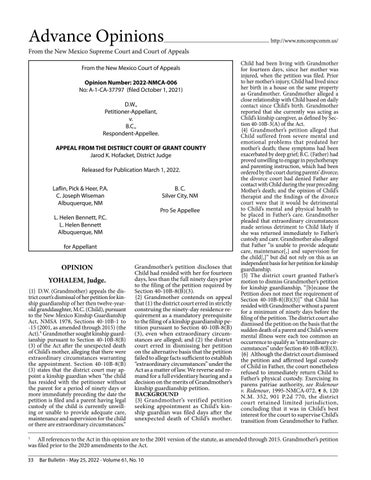Advance Opinions
http://www.nmcompcomm.us/
From the New Mexico Supreme Court and Court of Appeals From the New Mexico Court of Appeals Opinion Number: 2022-NMCA-006 No: A-1-CA-37797 (filed October 1, 2021) D.W., Petitioner-Appellant, v. B.C., Respondent-Appellee. APPEAL FROM THE DISTRICT COURT OF GRANT COUNTY Jarod K. Hofacket, District Judge Released for Publication March 1, 2022. B. C. Silver City, NM
Laflin, Pick & Heer, P.A. C. Joseph Wiseman Albuquerque, NM
Pro Se Appellee
L. Helen Bennett, P.C. L. Helen Bennett Albuquerque, NM for Appellant
OPINION YOHALEM, Judge. {1} D.W. (Grandmother) appeals the district court’s dismissal of her petition for kinship guardianship of her then twelve-yearold granddaughter, M.C. (Child), pursuant to the New Mexico Kinship Guardianship Act, NMSA 1978, Sections 40-10B-1 to -15 (2001, as amended through 2015) (the Act).1 Grandmother sought kinship guardianship pursuant to Section 40-10B-8(B) (3) of the Act after the unexpected death of Child’s mother, alleging that there were extraordinary circumstances warranting the appointment. Section 40-10B-8(B) (3) states that the district court may appoint a kinship guardian when “the child has resided with the petitioner without the parent for a period of ninety days or more immediately preceding the date the petition is filed and a parent having legal custody of the child is currently unwilling or unable to provide adequate care, maintenance and supervision for the child or there are extraordinary circumstances.”
Grandmother’s petition discloses that Child had resided with her for fourteen days, less than the full ninety days prior to the filing of the petition required by Section 40-10B-8(B)(3). {2} Grandmother contends on appeal that (1) the district court erred in strictly construing the ninety-day residence requirement as a mandatory prerequisite to the filing of a kinship guardianship petition pursuant to Section 40-10B-8(B) (3), even when extraordinary circumstances are alleged; and (2) the district court erred in dismissing her petition on the alternative basis that the petition failed to allege facts sufficient to establish “extraordinary circumstances” under the Act as a matter of law. We reverse and remand for a full evidentiary hearing and a decision on the merits of Grandmother’s kinship guardianship petition. BACKGROUND {3} Grandmother’s verified petition seeking appointment as Child’s kinship guardian was filed days after the unexpected death of Child’s mother.
Child had been living with Grandmother for fourteen days, since her mother was injured, when the petition was filed. Prior to her mother’s injury, Child had lived since her birth in a house on the same property as Grandmother. Grandmother alleged a close relationship with Child based on daily contact since Child’s birth. Grandmother reported that she currently was acting as Child’s kinship caregiver, as defined by Section 40-10B-3(A) of the Act. {4} Grandmother’s petition alleged that Child suffered from severe mental and emotional problems that predated her mother’s death; these symptoms had been exacerbated by deep grief; B.C. (Father) had proved unwilling to engage in psychotherapy and parenting instruction, which had been ordered by the court during parents’ divorce; the divorce court had denied Father any contact with Child during the year preceding Mother’s death; and the opinion of Child’s therapist and the findings of the divorce court were that it would be detrimental to Child’s mental and physical health to be placed in Father’s care. Grandmother pleaded that extraordinary circumstances made serious detriment to Child likely if she was returned immediately to Father’s custody and care. Grandmother also alleged that Father “is unable to provide adequate care, maintenance[,] and supervision for the child[,]” but did not rely on this as an independent basis for her petition for kinship guardianship. {5} The district court granted Father’s motion to dismiss Grandmother’s petition for kinship guardianship, “[b]ecause the Petition does not meet the requirement of Section 40-10B-8[(B)(3)]” that Child has resided with Grandmother without a parent for a minimum of ninety days before the filing of the petition. The district court also dismissed the petition on the basis that the sudden death of a parent and Child’s severe mental illness were each too common an occurrence to qualify as “extraordinary circumstances” under Section 40-10B-8(B)(3). {6} Although the district court dismissed the petition and affirmed legal custody of Child in Father, the court nonetheless refused to immediately return Child to Father’s physical custody. Exercising its parens patriae authority, see Ridenour v. Ridenour, 1995-NMCA-072, ¶ 8, 120 N.M. 352, 901 P.2d 770, the district court retained limited jurisdiction, concluding that it was in Child’s best interest for the court to supervise Child’s transition from Grandmother to Father.
1 All references to the Act in this opinion are to the 2001 version of the statute, as amended through 2015. Grandmother’s petition was filed prior to the 2020 amendments to the Act.
33
Bar Bulletin - May 25, 2022 - Volume 61, No. 10





